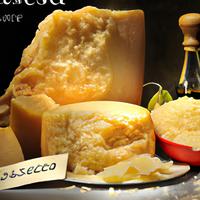
1 serving (28 grams) contains 110 calories, 10.0 grams of protein, 7.0 grams of fat, and 1.0 grams of carbohydrates.

Log this food in SnapCalorie

Nutrition Information
Calories |
440 | ||
|---|---|---|---|
% Daily Value* |
|||
| Total Fat | 28 g | 35% | |
| Saturated Fat | 18 g | 90% | |
| Polyunsaturated Fat | 0 g | ||
| Cholesterol | 80 mg | 26% | |
| Sodium | 1560 mg | 67% | |
| Total Carbohydrates | 4 g | 1% | |
| Dietary Fiber | 0 g | 0% | |
| Sugars | 0 g | ||
| protein | 40 g | 80% | |
| Vitamin D | 28 mcg | 140% | |
| Calcium | 1344 mg | 103% | |
| Iron | 0.8 mg | 4% | |
| Potassium | 104 mg | 2% | |
* Percent Daily Values are based on a 2,000 calorie diet. Your daily values may be higher or lower depending on your calorie needs.
Food Attributes
Source of Calories
About Parmesean cheese
Parmesan cheese, or Parmigiano-Reggiano, hails from Italy and is a hard, aged cheese prized for its nutty, salty flavor. Made from cow's milk, it undergoes a lengthy aging process, typically lasting 12 to 36 months, which enhances its rich taste and crumbly texture. Packed with nutrients, Parmesan is high in protein, calcium, and phosphorus, supporting bone health and muscle maintenance. It also contains beneficial enzymes and probiotics due to its fermentation process. However, Parmesan is high in sodium and saturated fat, so moderation is recommended for individuals managing heart health or blood pressure. Its robust flavor makes it a staple in Italian cuisine, often grated over pastas, soups, or salads, adding depth without needing large quantities. With its versatility and nutritional benefits, Parmesan cheese is a flavorful addition to many dishes when enjoyed mindfully.



